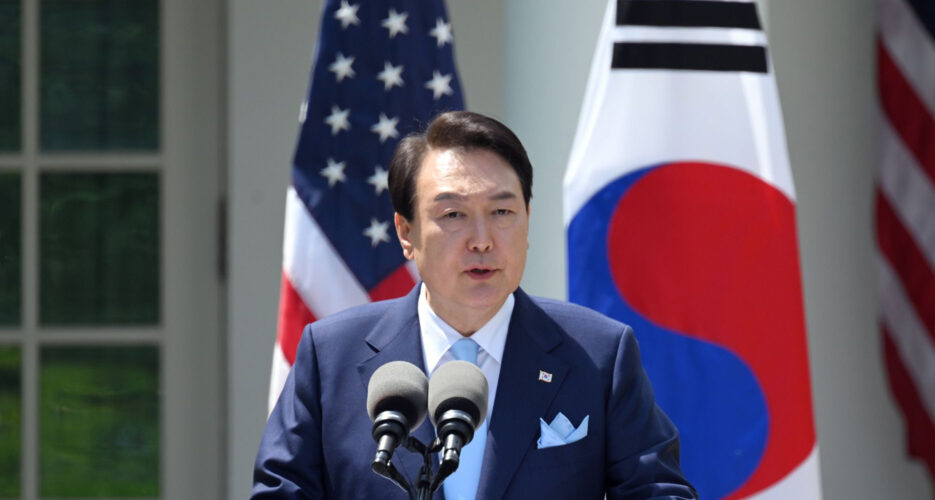Shreyas Reddy

South Korean President Yoon Suk-yeol hailed a new U.S.-ROK platform for discussing nuclear deterrence against North Korean threats on Tuesday as “more effective” than NATO’s analog for nuclear sharing, though experts say the two mechanisms cannot be compared as they are designed for different roles.
Yoon made the comments in his first cabinet meeting since agreeing to establish the Nuclear Consultative Group (NCG) in a summit with U.S. counterpart Joe Biden last week. The Washington Declaration released after the summit, he said, “upgraded” the alliance to “a new paradigm based on nuclear weapons.”
“The Nuclear Consultative Group (NCG), which was established as a high-level permanent consultative body between South Korea and the U.S., is more effective than NATO’s Nuclear Planning Group (NPG) in that it meets more frequently in one-on-one relations between South Korea and the U.S.,” Yoon said in the meeting, according to the presidential office.
Calling the U.S.-ROK alliance “the centerpiece of our diplomacy and economy” over the past 70 years, Yoon said his summit with Biden established an action plan for “South Korean-style extended deterrence.”
But despite the South Korean president’s attempts to portray the NCG as superior to NATO’s NPG, experts have stated that there are limitations to U.S. nuclear support for the ROK under the declaration.
Jina Kim, a professor and defense analyst at Hankuk University of Foreign Studies, told NK News after the summit that the two nuclear coordination groups are distinct and that Washington “can never redeploy nuclear weapons” in South Korea.
NATO’s NPG discusses policy relating to the alliance’s nuclear sharing arrangement, under which U.S. nuclear weapons are stationed in other countries. But while Biden and Yoon agreed to increase the visibility of strategic assets on the peninsula under the Washington Declaration, this does not entail the permanent deployment of U.S. weapons of mass destruction in the ROK.
The NCG is instead likely to resemble existing bilateral consultations on nuclear weapons policy, Ankit Panda, Stanton Senior Fellow in the Nuclear Policy Program at the Carnegie Endowment for International Peace, stated in an NK Pro analysis. Such consultations include the Extended Deterrence Strategy and Consultation Group (EDSCG) and the Korea-U.S. Integrated Defense Dialogue (KIDD).
Yoon’s remarks on Tuesday come after he previously appeared to misrepresent aspects of the Washington Declaration and accompanying agreements, which have met a cool reception in South Korea.
During a visit to the Pentagon on Thursday, the ROK leader said that any North Korean attempts to use nuclear weapons will result in “a decisive and overwhelming response” from the U.S. and ROK forces, “including U.S. nuclear capability,” according to the ROK presidential office.
By contrast, the Pentagon’s press release toned down his wording from “U.S. nuclear capability” to “U.S. military capability.”
In Tuesday’s cabinet meeting, Yoon once again stressed the need to strengthen security in order to ensure peace by “overwhelming power” if needed, but he did not specifically cite the use of U.S. nuclear weapons.
Meanwhile, the presidential office also announced Tuesday that Japanese Prime Minister Fumio Kishida will travel to South Korea for a two-day visit starting Sunday, the first visit to Seoul by a Japanese premier for a bilateral summit since Yoshihiko Noda in 2011.
Kishida and Yoon are expected to discuss bilateral issues as the neighbors look to improve relations, and they are also likely to discuss ways to enhance trilateral cooperation with Washington to counter North Korea’s nuclear threats.
No comments:
Post a Comment